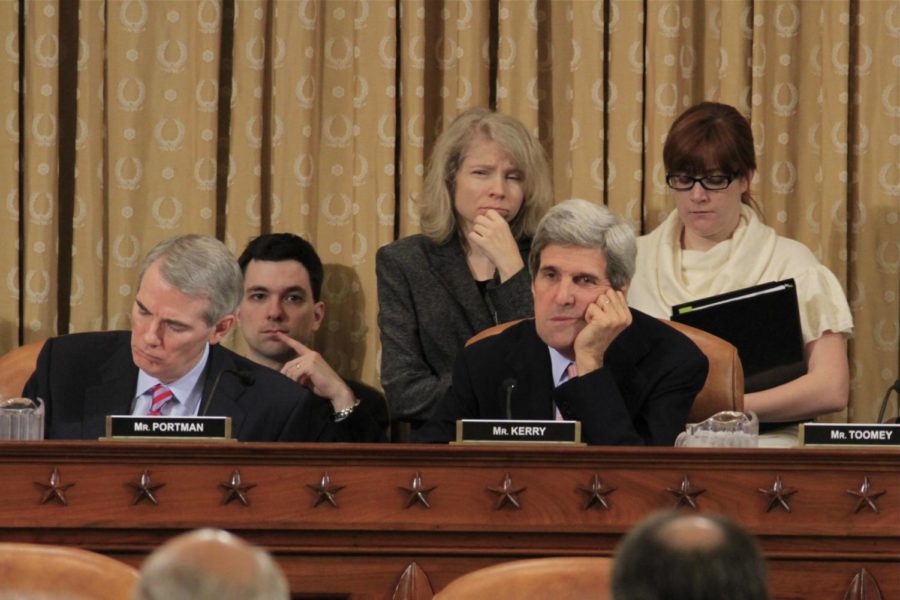Professors reflect on debt ‘supercommittee’ failure
Photo courtesy of Brian Yaklyvich
Super Committee Hearing on the Budget, 1100 Longworth Capitol Hill
November 24, 2011
The failure of the Joint Select Committee on Deficit Reduction, or “supercommitteee”, didn’t come as a surprise to many Americans, ISU professors said.
“It seemed doomed from the start,” said James Strohman, professor of political science.
The “supercommittee” was created Aug. 2 by the Budget Control Act of 2011 to prevent sovereign default, in which the government fails or refuses to pay back its debt, that would have resulted from the 2011 debt-ceiling crisis.
The committee was made of up six Democrats and six Republicans, both having three coming from the Senate and three coming from the House. The group had until Monday to formalize a plan to reduce the country’s deficit by at least $1.2 trillion.
“It was a good attempt,” said David Peterson, political science professor. “Private deliberation by a select group of people might be the only way to get anything done.”
However, supercommittee co-chairpersons Pat Murray, Washington senator, and Jeb Hensarling, Texas representative, said Monday in a statement:
“After months of hard work and intense deliberations, we have come to the conclusion today that it will not be possible to make any bipartisan agreement available to the public before the committee’s deadline.”
If the committee would have come to an agreement, its recommendation would have had to be voted on by Congress by Dec. 23. Peterson said he believed the debate would have ended in a gridlock.
“A minority can block the majority, which makes it hard to get anything done in Congress,” Peterson said. “It’s not catastrophic — it’s just what Congress was designed to do.”
Peterson explained that the disagreement in Congress and in the supercommittee stemmed from the fact that Democrats and Republicans are playing to different audiences. He said Democrats are playing to moderate voters while Republicans are playing to more conservative voters.
“Republicans have to be afraid of primary challenges,” Peterson said.
Republicans are particularly worried about threats made by Grover Norquist, president of Americans for Tax Reform. Strohman said Norquist created a pledge that called for Congress to never to raise taxes. Norquist has threatened Republicans in Congress by saying if they agree to raise taxes, they will have to run against primary competitors.
“He’s exerting influence over Congress,” Strohman said. “They are afraid to raise taxes.”
Peterson said Norquist has made a living out of pushing Republicans to be more conservative. He said, since Republicans are paying more attention to more conservative voters, Republicans in Congress are less likely to compromise in fear of losing conservative voters to their primary competitors.
Because Republicans refuse to raise taxes and Democrats refuse to continue tax cuts, the discussion has ended in a gridlock, Strohman said.
“There’s a conflict between fundamental beliefs,” he said. “It’s playing off as chaos.”
With the supercommittee failing to compromise, an automatic $1.2 trillion will be cut from the federal deficit. President Barack Obama said Monday that he will veto any attempt to stop the cuts unless Congress comes up with a plan to reduce at least $1.2 trillion from the federal deficit.
Peterson and Strohman both said Congress won’t come to an agreement in the near future. Peterson said he believes Congress will wait until after the 2012 elections to begin formulating a plan again.
“Most don’t want another showdown,” Peterson said. “People will be looking for who to blame [for the gridlock]. It’s too risky, especially so close to elections.”
Strohman said he thinks the supercommittee was created in order to test the future of the debate. He said the supercommittee was like a groundhog on Groundhog Day, testing to see how much longer the debate would continue like a groundhog tests how much longer winter will last.
“There’s no solution in site that looks like it will prevail,” Strohman said. “It looks like we’re in for 12 more months of this.”







